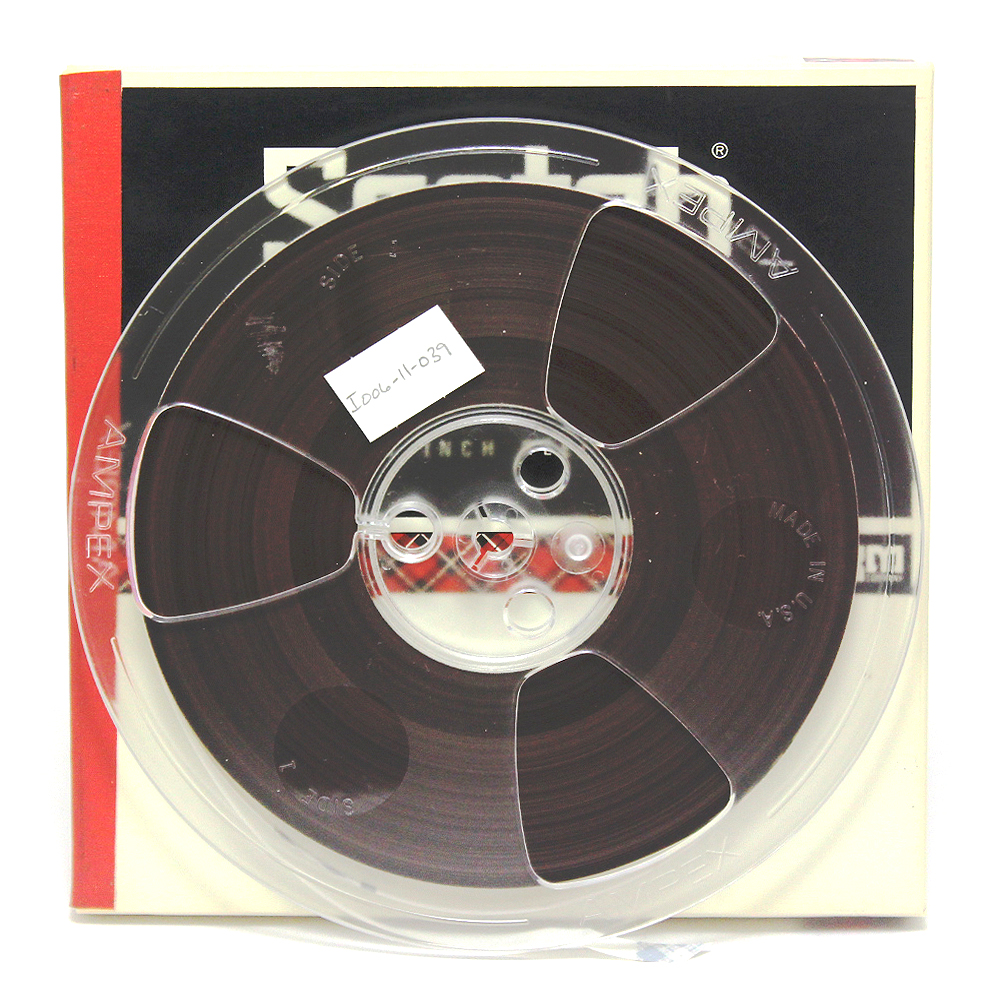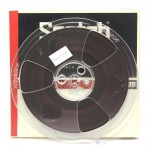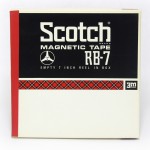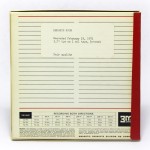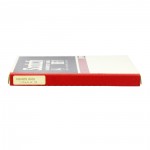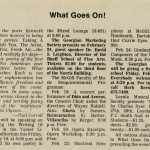Introducer - George Bowering
00:00:00.00
Most people will have seen, probably, the little promo sheet that went out about Kenneth talking about all his various books etcetera, so I'll keep this very short. Those that have been involved in reading American poetry over the past few years will naturally know who Kenneth Koch is, that he along with Frank O'Hara probably invented modern American poetry in New York City, and it's, and he's also been in the news lately in the various, Slick magazine in the United States as a teacher of poetry, a very important teacher of poetry to kids in schools. And he's the only man I know who's been able to write what I think is probably an epic in the American language. So I'd like to make this as fast as I can and introduce Mr. Kenneth Koch.
Annotation
00:00:58.09
Applause.
Annotation
00:01:03.02
Cut/Edit in tape; unknown amount of time elapsed.
Kenneth Koch
00:01:04.82
The first poem I'll read is called "Spring."
Annotation
00:01:08.13
Reads "Spring"
Kenneth Koch
00:02:36.23
The next poem I want to read is called "Variations on a Theme by William Carlos Williams." I love Williams' work, and I usually only write parodies of people whose work I like a lot. This parody is based on a poem of Williams, well, actually, on a certain characteristic I saw in Williams' work for a long time which I like, which is sort of, the idea that if you really like something enough and if you want to do it enough, it's okay to do it. And I saw certain insane possibilities of this viewpoint. This is specifically a parody of a poem which goes, "This is just to say I've eaten the plums in the icebox and which you were probably saving for breakfast. Forgive me, they were so cold and so delicious." It's really a nice poem, but it seemed to me there was a little streak of insanity running through it. It's called, "Variations on a Theme by William Carlos Williams."
Annotation
00:03:28.48
Reads "Variations on a Theme by William Carlos Williams"
Kenneth Koch
00:04:33.55
I'd like to read another short poem, this is called "You Were Wearing."
Annotation
00:04:38.45
Reads "You Were Wearing"
Kenneth Koch
00:06:37.10
I'm trying to find the ideal lights [inaudible], okay, I think that's probably a bit better. The next thing that I want to read is a play called "E.KOLOGY." It's...E.KOLOGY is the name of the hero, it's like capital "E," period, capital "KOLOGY." I'd like to say something about this play. I read it at the University of Chicago last year, and some students thought that I was making fun of the ecology movement. I'm not, and I would see to it that if it were produced that that was not the case. It just seemed to me that the ecology movement was such a, like a natural cause for pleasure that it wouldn't really do to be totally solemn about it. The, I wrote this to be performed on Earth Day, in New York last year in April, but they were supposed to have all these things in Union Square and it just ended up being a lot of light shows and speeches, I think, because they couldn't get the actors together and the lights and the stage and everything. It was done in Philadelphia, did anyone see it, by any chance? Probably not. I didn't see it. I didn't even know it was done. In any case. "E.KOLOGY".
Annotation
00:07:44.80
Reads "E.KOLOGY - Act One, Scene One".
Annotation
00:09:38.54
Reads "E.KOLOGY - Act One, Scene Two".
Annotation
00:11:19.98
Reads "E.KOLOGY - Act One, Scene Three".
Annotation
00:12:06.73
Reads "E.KOLOGY - Act Two".
Annotation
00:13:54.34
Reads "E.KOLOGY - Act Three, Scene One".
Annotation
00:14:24.73
Reads "E.KOLGOY - Act Three, Scene Two".
Annotation
00:16:04.76
Reads "E.KOLOGY - Act Four"
Annotation
00:17:30.23
Reads "E.KOLOGY - Act Five"
Annotation
00:19:34.18
Applause follows this reading.
Kenneth Koch
00:19:44.03
While you're in the mood for theatre, I'll read a film script I wrote which I'd be delighted if someone would do. No one's ever done it. Apparently it would cost a great deal to do this, although it's very simple. It's called “Youth”.
Annotation
00:19:57.41
Reads "Youth"
Kenneth Koch
00:21:36.54
I don't hear any takers unless [inaudible.] Let's see. This is a very short poem called, "Poem."
Annotation
00:21:53.23
Reads "Poem"
Kenneth Koch
00:22:11.96
This, this poem is called "Ma Provence," and my interest in writing it was the different way that French and English sound to me. "Ma Provence."
Annotation
00:22:23.40
Reads "Ma Provence"
Kenneth Koch
00:22:52.50
I usually translate the French, but I guess here I don't really have to. I'll read a...the French is very banal, it means, "In my Provence the wheat is always green, the girls are pretty, they love me madly, they never die in my Provence." This poem is called "Great Beauty."
Annotation
00:23:14.76
Reads "Great Beauty"
Kenneth Koch
00:23:31.35
This poem is called "Little Known Historical Fact"
Annotation
00:23:35.04
Reads "Little Known Historical Fact"
Kenneth Koch
00:23:48.53
Charlemagne is an Italian. [Laughter] This is called...[Laughter] "Getting Back on Land."
Annotation
00:24:06.05
Reads "Getting Back on Land"
Annotation
00:24:22.22
Laughter follows this poem.
Kenneth Koch
00:24:29.29
This, the next thing I want to read is part of a long poem I've been writing in the last year. George mentioned an epic poem I wrote called “Ko:, which I wrote about, oh twelve or fourteen years ago, and it's a poem...that's “Ko”, there it is, and it's about a hundred and twenty pages, it's in ottava rima, which is a stanza that Ariosto used in Orlando Furioso and it's also the stanza that Byron used in Don Juan. It rhymes ABABABCC. And...I really like “Ko” a lot. It's a poem about a, the main character is a Japanese baseball player, a pitcher, who throws the ball so hard he knocks the grandstand down with every pitch. And there are a lot of other characters in it. When I wrote the poem I really was very happy, I was living in Florence, in a villino, and, sort of outside of town on the Viale Michelangelo, and what I tried to do in “Ko: is like to put in every pleasant thing I'd ever experienced in my life, and the poem is kind of happy and optimistic. And I always wanted to continue it, because I liked writing that way. And I never could, because the continuation was always sort of in the style of “Ko” exactly and not as good. It sort of lost that particular feeling. Then I finally was able to start doing it again, recently, but I noticed as I went on writing the poem that it had changed a good deal, that my idea about life and the world was not quite the same, naturally, partly because it changes in me, and partly because it changes in the world, but I don't want to get into metaphysical questions. In any case, the first thing I want to read from this poem is the, like the “Prologue”, which explains my problems in continuing this very happy poem fourteen years afterwards. The only, I think the only thing that needs explaining that I haven't explained is that “Ko” ends with the line, "Huddle, meanwhile, was flaking at the knees." Now "Huddle" is a, like an Englishman in “Ko” who dies of mold fever in Rome, and when he dies he turns into a statue which is set up near the villa Giulia in Rome. And all of the other characters that have been killed sort of turn into statues and start coming back to life, and this is a sign that Huddle is coming back to life but he's flaking at the knees. In any case, that's referred to at the beginning of the “Prologue”.
Annotation
00:27:00.62
Reads "Prologue"
Kenneth Koch
00:34:08.27
That's the end of the “Prologue:. I want to read the first episode in the poem, now. I realize there was another, perhaps incomprehensible thing in the Prologue. Pana Grady...Pana Grady's apartment was a place on...Central Park West where a lot of parties were held for Upper and Lower Bohemia in the days...well, it was about five or six years ago. Anyway. That's the end of the “Prologue:, which I'm not sure I'm finally going to attach to the poem, since I usually eliminate prologues. And this is the beginning of the poem.
Annotation
00:34:55.61
Reads ["Long poem" - episode I]
Kenneth Koch
00:41:07.58
That's the end of the first part. To tell you what happens in this poem would take as long as reading the whole poem, which I don't have time to do. I think I'd like to read some brief, improvisational plays. I wrote these plays to be done at the Living Theatre, though I knew they wouldn't do them. Somebody asked me to write some improvisational plays, it's really, it's really great, you know, writes it with some actors that want to do it, and I'd, I'd seen some improvisational plays and it seemed to me that the only emotions that actors could improvise were...let's see, passion, nostalgia, self-hatred, anxiety, and then make narcissism and then make topical references, and I decide to really throw sort of a curve at actors and give them something that would really be hard to improvise. My penalty has been that these plays have never been done. The first one I'd like to read...I'd be very glad if they were, could be given a premiere here in Canada. "Mexico City."
Annotation
00:42:18.34
Reads "Mexico City"
Annotation
00:43:13.69
First CD of digital transfer ends.
Kenneth Koch
00:43:13.69
The next one is called "The Lost Feed."
Annotation
00:43:16.87
Reads "The Lost Feed"
Kenneth Koch
00:44:12.96
The next play is called "Coil Supreme."
Annotation
00:44:17.21
Reads "Coil Supreme"
Kenneth Koch
00:44:48.02
The last improvisational play I'll read is the one that has always moved me the most at the thought of production. It's called "The Gold Standard."
Annotation
00:44:57.30
Reads "The Gold Standard"
Kenneth Koch
00:45:54.96
I think I'd like to read a rather long poem called....my present plan, which--I don't want to really ruin people's evening, since I didn't start until 9:30, I think the poems that I would like to read will last until 11. So, it's twenty-five after ten now, I don't want to keep anybody up to late or anything. [Laughter] If...Don't feel bad about leaving if you have to go, I want to read these two rather long poems. This called "The Pleasures of Peace." I should say something about this poem, I wrote it...I started to write it, oh, three years ago, or whenever it was, maybe it was four years ago, but it took me a long time to write it. I guess about three years ago I started. It was at the moment of the, when there really was a lot of happiness in the peace movement in the United States. And it was like the first Peace Marches on Fifth Avenue, and people were jumping up and down for peace, and dancing for peace, and it really seemed as though what people were doing was going to do some good. And I remember feeling very excited in the first set of mass peace activities I was in because, being a poet, and having been brought up in America and everything and like almost all the other poets and artists I knew I sort of felt like a social outcast a little bit. And then I found, in the midst of the peace movement, like there were hundreds of thousands of people who sort of felt the same way about a lot of things, it was nice. And there was something very sort of grand and exciting about the peace movement which does not have anything to do with the issues at all, it was just a lot of fun. In a way it was sort of...it was very pleasant. There were a few other things that motivated this poem. One was I was very annoyed at a lot of my fellow-poets who were going around, giving, in groups to colleges, giving poetry readings for peace. Now there were two things about this that annoyed me, three things. One was that I wasn't doing it. But that, I think, was a minor thing. A second thing was that...who did they really think they were trying to convert, like college students who came to poetry readings? I mean, college students who come to poetry readings are not usually in favour of war. And in the second-place, all the poems they read for peace were the sort of things that would make you want to go out and kill people, like "Lyndon Johnson, you, fuck the pregnant woman who's lying with her guts streaming out," [Laughter] and they weren't, they didn't really...they didn't really seem like peace poems to me. It...And I felt it was sort of exploitative on their part to do that. So I wanted to write a--I'd never written a political poem and I wanted very much to write a poem, I had very strong feelings about the Vietnam War, and I wanted to write a poem against the war but which really, was really a poem, a positive poem about peace. I found it terribly hard to do, and I never worked so long on any poem. The fact that I worked so long on it does not mean that it's any better than anything else I ever wrote, but it was just hard, because I kept trying to put in sort of, things about suffering and so on, and they would jump out of the poem the way an artificial heart, I mean the way a transferred heart is sometimes rejected by the body. And I realized I was sort of stuck with writing a poem that was, like, one of my poems, it was really sort of a positive poem about peace.
Kenneth Koch
00:49:22.84
Another problem is that if you write a poem about the pleasures of peace it means you're writing a poem about the pleasures of life. And it's endless, in any case. That's about enough of that for now. It took me over a year to write, it was mainly the last part I couldn't write, since I didn't want to have sort of a literary copout at the end, and I didn't want to sort of end up, oh well, anyway. It's just a poem. The only thing--I got varied reactions to the poem. One...some dopey poet friend of mine came over and said, "Boy, you really put the peace movement down." And I haven't spoken to him very much since then. But then, a better reaction was that I got, some guy called me up and asked me if he could use this poem as his draft resistance statement. And I said you're going to languish in prison for a long time because, you know, judges don't like poetry. But anyway. Now just forget everything I've said [Laughter] and I'll read this poem. And there's a pause. "The Pleasures of Peace." Oh! Another thing. [Laughter] I read this poem in London last year, and I got this dopey review in the Times by, who was it....I'm not sure. And he said, "Kenneth Koch's 'Pleasures of Peace' is a very interesting poem but since he mentions the name of all his friends which we can't be expected to know--like about 90% of the people in this poem are imaginary. They, they're not my friends. [Laughter] Okay. Like Georgio Finogo is not a real person, okay?. "The Pleasures of Peace."
Annotation
00:51:15:10
Reads "The Pleasures of Peace"
Annotation
01:11:09.19
Applause concludes this poem.
Kenneth Koch
01:11:15.38
Thank you.
Kenneth Koch
01:11:22.91
I want to read another poem which will take about seven minutes, but just to rest up I'll read a short poem. ...I can't find one short enough. ...Oh, this is called "An X-Ray of Utah."
Annotation
01:12:00.33
Reads "An X-Ray of Utah"
Kenneth Koch
01:12:08.71
Well that's the shortest poem I ever wrote. [Laughter] Except, there's one that's not in any of my books which is called "Tennis," which is the same length.
Annotation
01:12:19.32
Reads "Tennis"
Kenneth Koch
01:12:29.07
Oh, I think I'll read a few movie scripts. I'll just read a few. This is really for, this is from something called "Ten Films," but I'll just read a few of them, which are my favourites. One of the films is called "Sheep Harbour."
Annotation
01:12:44.19
Reads "Sheep Harbour"
Kenneth Koch
01:12:57.56
Like, the camera could sort of show this for a long time.
Annotation
01:13:03.34
Reads "Oval Gold"
Kenneth Koch
01:13:19:73
I'll just read one more of these films. This is called "The Cemetery."
Annotation
01:13:24.52
Reads "The Cemetery"
Kenneth Koch
01:13:49.66
I'll read this one last poem which is called "Sleeping with Women." "Sleeping with Women."
Annotation
01:13:54.65
Reads "Sleeping with Women"
Annotation
01:22:37.36
END OF RECORDING
